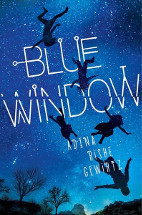Blue Window by Adina Rishe Gewirtz

Candlewick Books, 2018. ISBN 9780763660369
(Age: Older adolescents - Adults) This powerful novel, epic in
scope, presents an undiscovered world that seems to be both
predictably human and terrifyingly inhuman. Seeming to fall into a
new world through a blue glass window, five imaginative siblings
find themselves caught in an unexpected place where what they have
known as normal does not exist. Their aim is to escape but they
cannot understand how they have been caught in the new world, so the
possibility of leaving seems to be physically impossible.
This is a world of upheaval, violence and fear, a world where the
inhabitants are oppressed, bullied and subjugated to rules that
dominate their lives. They are largely unaware of a possibility of a
world that offers freedom, peace or love. We are aware that Gewirtz
subtly suggests changes in our world that mimic that of her
dystopian society, such as control of free thought, of liberal
education, or of equality and justice. Both disturbing and violent,
this world suggests that some of the present and past worlds that we
have known or inherited are the result of the potential for human
beings to allow those with power to overrule others to the extent
that all known freedoms cease to exist, and dominance, in all
aspects of life, to quash the spirit.
In this dystopian world, the inhabitants, strange-looking and with
quite different ideas about life, seem to follow many of the ways of
the children's own world, yet their world runs on different rules.
It ought to be terrifying but the children seem to find the strength
to analyse the way this world works and the strength to resist
further exploration, and to realize the power of their own
individual strength. The power of their minds to dream up a scenario
seems to be one avenue of enabling change, as they discover, and it
is this positive thinking that offers escape but, paradoxically,
alerts the inhabitants to their presence and endangers them.
This novel is about the power of goodness, decency, kindness,
intelligence, and the capacity of the human spirit to overcome
extreme repression. It speaks of aspects of societies that our world
has known, but placing the children in one such world evokes both
our empathy and our fear of the power of thought and persuasion. I
found it disturbing and unsettling to read, with such young people,
unable to reach their own family and known world, plunged into such
a harsh and violent world. The characters, somewhat ingenuously,
appear to not realize the actual threat of that world, and their
strength of character, loyalty and love, appear to enable them to
find the means to flee.
Qualities such as persistence, kindness and decency are important in
the interactions of the children, both within their little group and
with the locals. Their return to their family home is a satisfying
ending, but plunging such young people into such a violent and
oppressive world evokes a disturbing response in the reader.
Beautifully written, this book is suitable for older adolescents or
adults.
Elizabeth Bondar